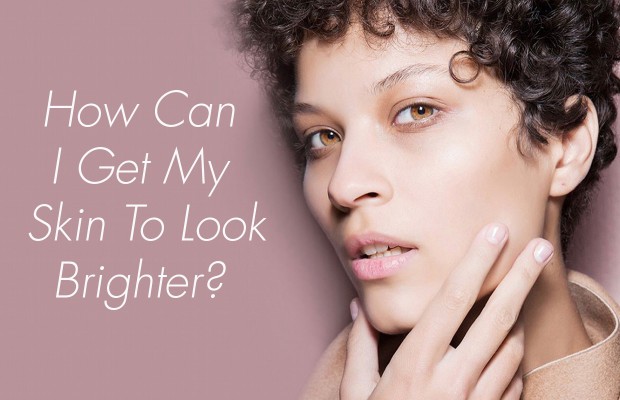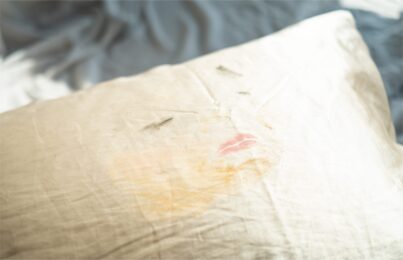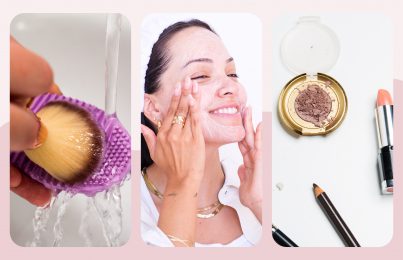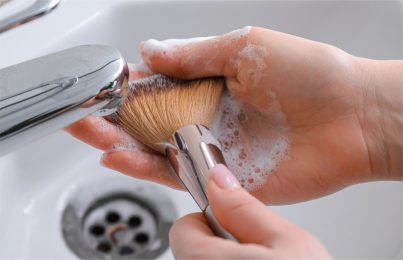What can I do to get brighter skin without wearing makeup?
Like with any skincare question that I get, before I offer a solution, I will first try to isolate the underlying cause of the concern. Having been asked this brighter skin question frequently, I have identified two main causes as to why someone’s skin doesn’t appear as bright as it could be when not wearing makeup.
In this post, I’ll go into detail about what these two are, and how you can improve a dull appearance to bring a brighter look back to your skin. Additionally, I will go into the differences between brighter-looking skin versus a skin that has a glow. (In my 30 years of hands-on experience as an esthetician, I actually see these as two separate concerns and the solutions for each are vastly different.)
What does it actually mean to have bright skin?
Having skin on your face that looks bright has to do with your own natural skin color and whether or not it has an even tone. This solely lies in the activity of your melanin cells.
When you are born, your skin is one even color (light, medium or dark) and will remain this one color until something stimulates your melanin cells to release pigment such as brown spots. When these appear, this new discoloration will be many shades darker than your natural skin color so this creates both light and dark areas on your skin.
So, what does it mean to have brighter skin? I believe it’s when your skin has all (or as much as possible) of the lighter version of your skin’s own natural color. This is what is referred to as “even-toned” skin. Think of brightness in this way. It’s brighter when the sun is out versus when it’s cloudy, right? Or it’s brighter when you have the lights on versus when they are turned off. For a real-life example one of my clients who came to me asking for her skin to look brighter, look at this before and after picture. It’s obvious which photo shows her skin looking brighter.
What is causing my skin to not look bright?
There are two causes for why the skin won’t have an even color to it when not wearing makeup.
1. Brown pigment spots and patches.
Here is why your skin will show brown areas on your face.
Hormones
Hormones, estrogen and progesterone particularly, can cause the skin to produce more melanin activity resulting in hyperpigmentation. If you’re taking birth control pills or if you’re pregnant, this will increase your chances of getting a skin discoloration condition known as melasma.
Read how hormones will affect the skin in your teens, 20s, 30s, 40s, 50s and 60s.
Genetics
A lot of people who have discoloration on their skin will automatically think it’s because of past time spent in the sun. While the sun will bring out pigment faster, it’s important to know that some people genetically have more melanin in their skin than others. For example, there are plenty of 80-year old sun worshippers that don’t have many brown spots despite showing a lifetime of sun damage. Freckles are also due to genetics. It’s an abundance of melanin cells that are hard-wired into the skin passed on from a parent.
Age
Regardless of genetics, discolored cells will naturally rise to the surface with age. (Hormones play a part in this.) As for freckles, you’re not born with them, but they will start to develop as young as age three as more and more sunlight gets onto the skin.
Sun
Did you know that not only will the sun bring out dark brown spots but the heat that comes from the sun is also a cause? When on a beach, you can slather your skin with sunscreen and stay exclusively in the shade but find that at day’s end, brown spots will still appear. (Frustrating for all of us faithful sunscreen wearers!) Read how to prevent sun spots.
2. Red, purple and dark acne scars left over from blemishes and cysts.
An abundance of darker scars on the face will also make the skin look less bright.
When you have a blemish (and especially if you picked at it), you’ll be left with a red or purple scar known as post-inflammatory hyperpigmentation (PIH). This occurs when the melanocytes (melanin-producing cells) in the epidermis release more pigment. Eventually, these discolored cells will settle down and the new cells will replace the darkened scarred ones. This is due to the natural cellular turnover and shedding process of the skin.
Cystic blemishes, which typically do not break through the top layer of the skin, will still result in discoloration. This is because the infection has stretched and damaged the surrounding tissue resulting in an increase of melanin activity. Cystic acne starts so deep in the skin that scarring (red, dark and purple marks) is an all-too-common side effect.
What can I do to lessen discoloration to get brighter skin?
Regardless of the cause, the solution is pretty much the same. There are four main focuses for getting the skin to appear more even-toned, and ultimately make it look brighter.
1. Exfoliate regularly. (But not daily!)
The best way to dissolve and break apart discolored cells is to use an exfoliating acid serum several times a week. Take my Skin Type Quiz to see which exfoliating acid serum is best for you.
Then, a physical exfoliator such as a facial scrub like Mint Buffing Beads or a sonic cleansing brush used a few times a week can lift off those cells to make sure they are actually removed. You can also apply a product containing retinol, as this too will help stimulate cell turnover to get discoloration to appear lighter. With exfoliation, however, be sure to follow the instructions for usage because you don’t want to overdo it and cause irritation. Read the beginner’s guide to exfoliation as well as the beginner’s guide to using retinol or prescription retinoids.
You might also consider seeing an esthetician or dermatologist about getting a series of chemical peels or laser treatments, which can remove pigment quickly for most people.
2. Use a pigment-brightening product.
Applying a brightening serum daily will help fade pigment significantly. I recommend beginning with one that doesn’t require a prescription and that contains the vitamin C active ingredient, magnesium ascorbyl phosphate. This is a proven melanin suppressor to put pigment cells to sleep and lighten stubborn discoloration with continued use. Just remember, it’s important to address brown patches as soon as possible. (Such as after a beach vacation.) Since skin cells have a memory, the longer the skin pigmentation is present, the longer it may take to fade. Sometimes, a topical skin bleach prescription is needed, but using a well-formulated vitamin C serum is a really good place to start.
3. Wear sunscreen daily.
Without a doubt, sunscreen will greatly reduce how long the hyperpigmentation, whether caused by the sun, heat, or a blemish, will stay on the skin. What’s important to understand is that UV daylight (even on a cloudy day in January) will keep pigmented cells active whenever it sees the skin. The goal with discoloration is to put pigment cells to sleep, and if they are woken up due to daylight (or sunlight), they will remain on the skin longer.
So many people are hyper-focused on skin brighteners, bleaches, and acid exfoliators to be the cure-all, but aren’t aware that good work being done can go to waste if you’re not keeping daylight away from the skin’s surface. Simply put, if you want bright skin you have to wear sunscreen daily. It must be applied generously to the skin and be worn during all daylight hours, 365 days a year.
4. Treat your blemishes the correct way.
While you don’t always have control over a blemish from appearing, you DO have control as to how you treat it. Most people just dab on a drying spot treatment the moment it comes up in hopes of drying it out and making it go away fast. However, I’m here to tell you that this is completely incorrect. Doing so, will make your blemish last longer, and the longer it sticks around, the more discoloration you’ll get. Please read my step-by-step guide for getting rid of a blemish fast.
How can I get my skin to have a glow?
I’m known for giving the famous #ReneeRouleauGLOW and as I mentioned, I believe there is a distinct difference in having brighter-looking skin versus glowing skin. I feel that achieving a radiant glow has to do with light reflection and the underlying circulation and oxygen within your skin. If you follow all of my advice on how to get your skin to look brighter without makeup AND you follow my tips for getting a glow, you’ll have the best of all worlds. Read how to make your dull skin have a glow.
What about wearing makeup?
The quickest and easiest way to get brighter skin and have it look more even-toned is to apply a foundation makeup. While I know your goal is to not have to wear it, I actually always advise my clients to wear some form of makeup every single day. The main reason is that foundation forms a barrier of protection that guards your skin against the damaging rays given off by the sun and daylight. You can read my thoughts about wearing makeup daily here.
In summary, having skin that looks bright and even-toned does require effort, but with the right products and guidance from a trusted skincare pro, you can definitely make some huge improvements with your skin as long as you’re staying consistent. I hope you found this post helpful so you have a solid game plan for how to get brighter-looking and even-toned skin. If you need further assistance, you can schedule a virtual consultation with an esthetician.
Celebrity Esthetician & Skincare Expert
As an esthetician trained in cosmetic chemistry, Renée Rouleau has spent 30 years researching skin, educating her audience, and building an award-winning line of products. Her hands-on experience as an esthetician and trusted skin care expert has created a real-world solution — products that are formulated for nine different types of skin so your face will get exactly what it needs to look and feel its best. Trusted by celebrities, editors, bloggers, and skincare obsessives around the globe, her vast real-world knowledge and constant research are why Marie Claire calls her “the most passionate skin practitioner we know.”



